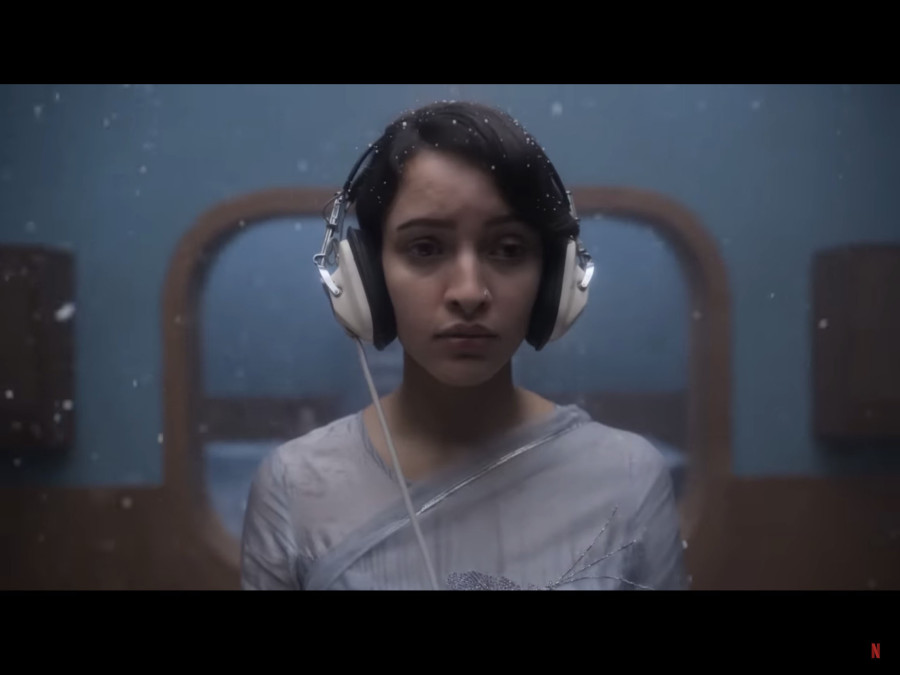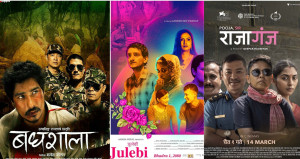Movies
‘Qala’: Sharp, visceral and captivating
The film, written and directed by Anvita Dutt, follows the tragic life of a singer, Qala Manjushree.
Manushree Mahat
Qala Manjushree is a singer. No, not just any singer—perhaps the best of her era. She is talking to reporters after winning the prestigious ‘Golden Vinyl’ award. The clicks and flashes of cameras follow her. One of the reporters asks her the typical how-do-you-feel question about her recent accomplishment. Her reply is a bit theatrical but fairly emotive. “It feels like I’ve finally reached home, spent and exhausted, and Mother has opened the door, welcoming me,” she says.
If it were any other movie, this line probably wouldn’t have such an effect on me. But after being rendered emotionally and mentally tattered by ‘Qala’, the thinly veiled longing that underlies that casual line is hard not to think about.
‘Qala’, written and directed by Anvita Dutt, follows the tragic life of a singer, Qala Manjushree (Tripti Dimri). Qala (a play with the word kala, which means art) basks in the glory of her successful career while also grappling with the trauma and guilt of her past. Going back and forth between the past and present, the film explores the complexities of mother-daughter relationships, childhood trauma, misogyny, and ambition.
The core theme of ‘Qala’ revolves around the relationship between Qala and her emotionally detached, often neglectful, and demanding mother. Early in the movie, it is established that Urmila Manjushree’s (Swastika Mukherjee) deep-seated disdain for her daughter began after discovering that her stillborn son was allegedly ‘absorbed’ by her daughter in the womb. Things become further intense after Urmila adopts a talented, orphaned singer, Jagan (Babil Khan), whose career she tries to establish.
It is painful to watch Qala subjected to years of neglect and emotional abuse. Urmila Manjushree is almost evil to the point of irredeemable. The unjust hatred and internalised misogyny she projects into her daughter culminate in her putting Qala through all sorts of pain, going as far as locking her out of the house (Qala’s earlier statement about her mother opening the door rings hollow after this). She constantly sidelines Qala for Jagan and diminishes Qala’s abilities to sing by likening her to a cuckoo that steals its nest and achievement from others.
Dutt’s direction is deliberate and meticulous. It can be a tad bit difficult to keep up with the separate timelines, but the events in Qala’s past coincide sublimely with her increasing fragility in the present.
For instance, in the present, the death of Sanyal (Sameer Kocheen), a famous singer, is shown to shake Qala to the core. Right after that, the movie cuts back to the past, where Urmila is shown seducing Sanyal to further Jagan’s career. The seamless transition is just an example of the film’s clever screenplay.
The storytelling of Qala relies heavily on its mesmerising and deeply unsettling visuals. Siddharth Diwan, the cinematographer in Dutt’s first movie, ‘Bulbbul’—an equally stunning movie—delightfully captures the melancholy imbued within every aspect of the story. Set against the backdrop of the snowy mountains of Himachal Pradesh, every scene of the movie is draped in cold darkness to highlight the disturbing aspects of the plot.
One scene that particularly stands out as a masterclass visually and in direction is the aerial shot of Qala and Jagan as he’s shielding her from the falling snow. The camera swings to capture them stuck in a maze-like structure with just one exit. This foreshadows Qala’s ambition to eliminate her stepbrother and competition to follow a solitary road to victory.
The soundtrack of the movie is melodious. Composed by Amit Trivedi, the majestic beats of classical instruments like dholak and accordion teleports you right back into the olden days of Bollywood. The song ‘Shauq’ beautifully treads the line between buoyancy and hostility, as Urmila shamelessly cuts Qala’s verse to encourage Jagan, while the gentle breeze offsets Qala’s growing resentment towards him.
We witness Qala’s descent into ruthless ambition, marked by the song ‘Udh Jaayega,’ composed by Sagar Desai, with lyrics by Sant Kabir. Dripping with ‘Black Swan’ inspired imagery, she is seen bedecked in black feathers as she begins her lonely, ambition-fueled journey into music, while Jagan paradoxically reaches the end of his.
Dimri is hypnotising to watch on screen. Qala is a complicated character—starved for her mother’s appreciation, she commits a gut-wrenching act of sabotage. The younger Qala, overlooked and dejected, is as heartbreaking to watch as the older Qala, whose mask of charisma is slowly crumbling away to reveal the gash of her mother’s rejection and the demons of her past actions. Watching Dimri’s nuanced portrayal arouses sympathy as she embraces her character’s psychologically tortured and dysfunctional state of mind.
Mukherjee is just as hard to watch as the frigid—bordering on evil—mother. Watching Urmila’s eyes soften towards Jagan while dealing Qala with the misogynistic card of trying to marry her off is painful to watch. Babil Khan, in his debut, delivers the honesty and rawness the script demands of him as the optimistic, soulful Jagan—a desolate, heartbroken persona grappling with the straws of his dying dreams. None of the performances feels overly dramatic; each character’s delicate shades of melancholy, agony, and grief tie together perfectly in the inevitable ending to this tragic story.
Qala is not an easy movie to swallow, but I have rarely watched something that combines a character’s debilitating mental health with their distressful past so viscerally. It is heartbreaking, gut-wrenching, and emotionally draining, but it is a movie worth watching.
Qala

Language: Hindi
Subtitles: Available
Cast: Tripti Dimri, Swastika Mukherjee, Babil Khan
Year: 2022
Duration: 1 hour 59 minutes
Available on: Netflix




 12.12°C Kathmandu
12.12°C Kathmandu














